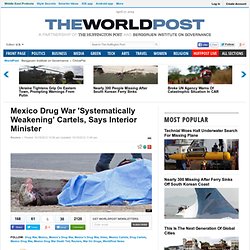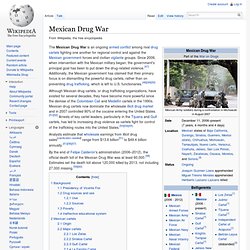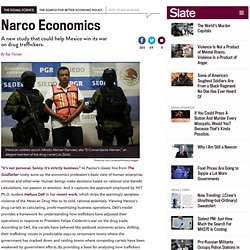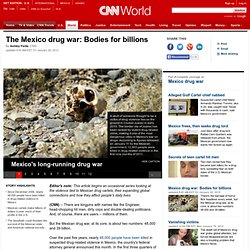

Mexico Drug War 'Systematically Weakening' Cartels, Says Interior Minister. By Fredrik Dahl VIENNA, Oct 15 (Reuters) - Mexico is making progress in its fight against powerful drug cartels and they are becoming weaker as the crime bosses are killed or jailed, the interior minister said on Monday.

Since 2009, about two-thirds of those identified as Mexico's 37 most- wanted criminals that year have either been killed or face legal action, Alejandro Poire said. "I think that is an indication that the top level of these organisations is no longer capable of doing what (it was) capable of doing only three years ago," he told reporters during a U.N. conference on cross-border crime. "Also at the immediately lower level we are systematically bringing down some of the most dangerous criminals. " Earlier this month, Mexico said it killed Heriberto Lazcano, the leader of the brutal Zetas gang and the most powerful kingpin to fall in the battle against cartels.
Poire said bringing crime bosses to justice diminished the cartels. "I would say we are making progress. US drug addiction impedes Mexican growth – President Calderon. Mexican Drug War. The Mexican Drug War is an ongoing armed conflict among rival drug cartels fighting one another for regional control and against the Mexican government forces and civilian vigilante groups.

Since 2006, when intervention with the Mexican military began, the government's principal goal has been to put down the drug-related violence.[47] Additionally, the Mexican government has claimed that their primary focus is on dismantling the powerful drug cartels, rather than on preventing drug trafficking, which is left to U.S. functionaries.[48][49][50] Although Mexican drug cartels, or drug trafficking organizations, have existed for several decades, they have become more powerful since the demise of the Colombian Cali and Medellín cartels in the 1990s.
Analysts estimate that wholesale earnings from illicit drug sales[clarification needed] range from $13.6 billion[51] to $49.4 billion annually.[51][56][57] Background[edit] Presidency of Vicente Fox[edit] Mexico's drug cartels fight back - 06 Dec 08. Reporting on the frontline of Mexico's drug war. Official "Cartel" Book Trailer. Felipe Calderón’s war on drugs: How forensic economics can help Mexico beat traffickers.
Photo by Yuri Cortez/AFP/Getty images.

“It’s not personal, Sonny. It’s strictly business.” Al Pacino’s classic line from The Godfather nicely sums up the economics profession’s basic view of human enterprise, criminal and otherwise: Human beings make decisions based on rational cost-benefit calculations, not passion or emotion. And it captures the approach employed by MIT Ph.D. student Melissa Dell in her recent work, which strips the seemingly senseless violence of the Mexican Drug War to its cold, rational essentials. Viewing Mexico’s drug cartels as calculating, profit-maximizing business operations, Dell’s model provides a framework for understanding how traffickers have adjusted their operations in response to President Felipe Calderón’s war on the drug trade. The Mexico drug war: Bodies for billions. A skull of someone thought to be a victim of drug violence lies on the ground in Ciudad Juarez in early 2010.

The border city of Juarez has been racked by violent drug-related crime, making it one of the most dangerous cities in Mexico's war on drugs. According to figures released on January 11 by the Mexican government, 12,903 people were killed in drug-related violence in the first nine months of 2011. Mexican Federal Police stand guard over 105 tons of marijuana seized in Tijuana, Mexico, in October 2010.
Smuggling remains a booming business. For example, south of the border it costs $2,000 to produce a kilo of cocaine from leaf to lab, according to the DEA. The cartels arm themselves heavily. Mexican army soldiers display $15 million U.S. on November 22, 2011, in Mexico City. Two bodies hang from a bridge in Mexico in September 2011. The Mexican Drug War Is Not Sexy - Chris Feliciano Arnold. Movies, TV shows, and songs have a warped way of portraying the violent conflict.

Relativity Media At daybreak on June 3rd, border patrol agents in the Vekol Valley south of Phoenix followed a set of tire tracks that veered off Interstate 8 and into the rugged desert. A burnt sport-utility vehicle smoldered on the horizon. Inside they discovered five bodies charred so badly it was impossible to determine their age, gender, or ethnicity. "It looks like a cartel hit," Pinal County Sheriff Paul Babeu told reporters shortly after, calling a drug connection "very likely" in this region known for trafficking. Media nationwide picked up the story, including CNN, Fox, and CBS, adding another grisly tableau to a border narrative that's turned increasingly violent since Mexican President Felipe Calderón escalated the drug war in 2006.
Hold up there, Sheriff. The hasty conclusions in Arizona underscore how the spectacle of ultraviolence has the potential to obscure facts. That's a worthwhile goal. Mexico 'favours' Sinaloa cartel.